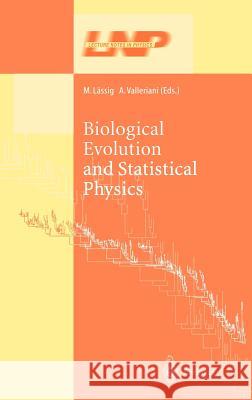Biological Evolution and Statistical Physics » książka
Biological Evolution and Statistical Physics
ISBN-13: 9783540431886 / Angielski / Twarda / 2002 / 342 str.
People have always asked what distinguishes the living from the inanimate world and what uni?es the two. The ?elds of biology and physics have a long history of exchange. Milestones at the molecular level were the discoveries of the structure ofDNA, RNA, andproteins. It is not by coincidence that this exchange has intensi?ed in recent years. Laboratory experiments reach down to the level of single molecules. Moreover, thereisnowavastamountofgenomicinformation, whichisstillgrowingex- nentially due to the various sequencing projects. Biologists increasingly feel the need for theoretical models to interpret these data in a quantitative way. At the sametime, theoreticalphysicshasmadesigni?cantprogressinareaslikelyto be relevant for the understanding of biological systems. Some important ex- plesarecooperativephenomena, statisticsfarfromthermodynamicequilibrium, systemswithquencheddisorder, andsoftmatter. Some forms of biological matter have indeed become established areas of - searchwithinphysics, suchasbiomembranes, heteropolymers, molecularmotors, microtubules, neuralsystemsetc.Thisvolumeisfocusedonadi?erentaspect of the living world that can be calledbiologicalinformation, itscoding, rep- duction, andevolution.Biologicalinformationistranslatedintostructuresand patternsoveranenormousrangeofscales, fromsinglebiomoleculestospecies networks coupled over entire continents. Thestatisticaltheory of biological information lives not only in three-dim- sional space. It involves various abstract spaces in which this information is encodedandevolves, suchasnucleotidesequences, genenetworks, ortopologies of the 'tree of life'. The articles collected highlight a few directions of research that may become important parts of this emerging ?eld. The ?rst part of the book, MolecularInformationandEvolution, startswith twoarticlesonsequencesimilarityanalysis, acentralthemeinbioinformatics which has surprisingly deep connections to statistical physics. The genetic code, RNA, andproteinsarethreeexamplesoftheintricateinterplayofsequence, structure, andfunctioninevolution.











